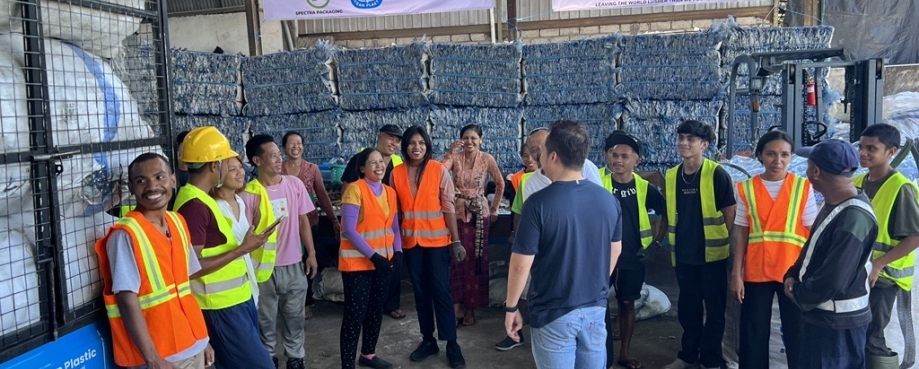
In 2016 the Ellen MacArthur Foundation provided the shocking insight that by 2050 there may be more plastic in our oceans than fish, by weight. Since then, many businesses have taken steps to reduce their plastic packaging.
Companies such as Aldi, have committed to reduce plastic packaging by 50% by 2025 and Primark, have committed to eliminate single use plastic by 2027. The classic mantra popularised in environmental discussions when I was at school in the 1980s continues to feel valid: Reduce, Reuse, Recycle – and in that order. With an estimated 400 million tonnes of plastic produced each year, and some of it (but certainly not all of it) used for purposes where viable alternatives don’t yet exist, there is definitely a need for plastic recycling services.
ETI company member Bantam Materials UK Ltd. is a company offering such a service. Bantam have pioneered standards for Prevented Ocean Plastic– incentivising the collection of plastic waste, specifically PET (polyethylene terephthalate) bottles, at high risk of reaching our seas and oceans. What is more, their business model recognises, values, and integrates the essential services provided by informal waste pickers around the world.
There are an estimated 20 million informal waste pickers globally, who make a living by collecting wasted materials, separating them, and selling them to recyclers for reuse. This is hard, physically demanding work. Most workers are part of the informal economy, with often no access to social protection schemes. Occupational health and safety hazards are widespread – from handling sometimes dirty and contaminated waste material, with little PPE, to working long hours in all weather conditions, and often exposed to unsafe levels of air pollution in the world’s megacities. In addition, this work is often highly stigmatised, with informal waste pickers sometimes shunned by other sections of society. Despite all this, waste pickers play an essential role in keeping our cities clean and contributing to progress towards a zero waste economy.
Bantam and its network of waste collectors is making strides to a zero waste economy, and its business model and approach exemplifies how environmental challenges and their solutions cannot be separated from human dimensions. Bantam joined ETI as a Foundation member in 2021 and is making positive progress against the entry level requirements of our Progression Framework - ETI’s practical tool which enables companies to develop and integrate a human rights due diligence approach.
Currently, Bantam sources from collection centres across Indonesia- some of these are owned by the company while others operate independently, but all are being elevated to a unique standard. These are professionally run workplaces that buy PET bottles from waste pickers in exchange for real, on-time payments. The sorters at the waste collection points remove caps and labels (these are sent to other recyclers), crush the bottles, and aggregate into bales that are guaranteed 99% PET. These are sent to recycling plants where, after further processing they are shredded into flakes or pellets and then used to create new PET products. For example, Bantam currently supplies fellow ETI company member Lidl with 100% recycled plastic trays for its fresh fish. Prevented Ocean Plastic is now used in over 500 products. Through its network of collection centres, who in turn aggregate PET bottles from thousands of waste pickers, Bantam stops thousands of tonnes of plastic from entering the ocean each year and has so far collected 2.5 billion bottles to be turned into new products. The business has plans to open 25 new collection centres by 2025, further increasing its impact.
Bantam has incorporated the ETI Base Code into its Prevented Ocean Plastic standards which covers the recyclers in its supply chain. As a next step, Bantam is reaching further into the chain to develop standards for collection centres and drive transparency in a notoriously complex and opaque sector. In 2024, Bantam plan to conduct worker surveys at the collection centres, in addition to engaging with management to better understand the issues in daily operations. It is committed to protecting the rights of the informal waste pickers that play a critical role in its supply chains.
Bantam’s supply chains demonstrate the critical role workers play in ensuring we safeguard a liveable planet for future generations; unless workers’ rights are recognised and respected and their skills and knowledge valued, our chances of securing a transition to a better future are slim.
The ILO has defined just transition as “Greening the economy in a way that is as fair and inclusive as possible to everyone concerned, creating decent work opportunities and leaving no one behind.” Discussions around the just transition often focus on economic opportunities opening-up in renewable energy or in electric vehicle design and production. Waste collection and recycling might be less glamourous, but it plays just as critical a role in the just transition. Waste pickers, collectors and recyclers provide an essential service in the cities where they live and work. And all our lives depend on healthy oceans for fish and sea food, for transport and recreation, and as carbon sinks – indirectly we all benefit from the work undertaken by waste workers. We recognise Bantam’s Prevented Ocean Plastic programme as just one opportunity to make sure every bottle is counted, and every person counts.
